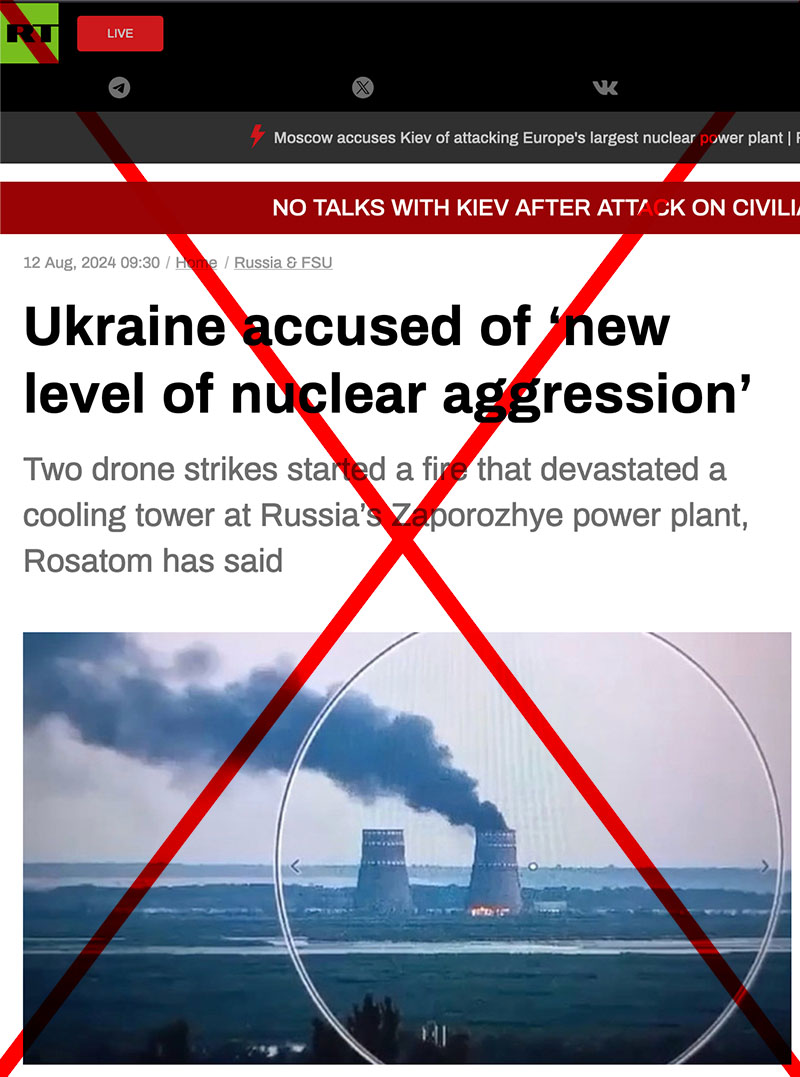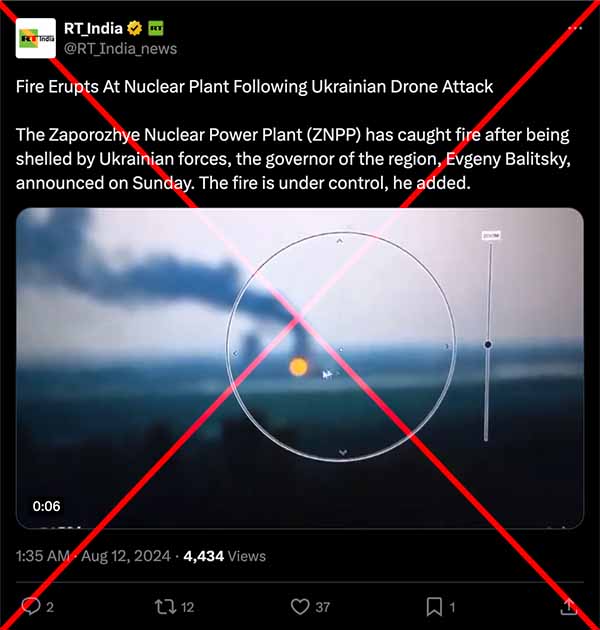 The Claim:
The Claim:
The Russian government has claimed that the Armed Forces of Ukraine have deliberately targeted the Zaporizhzhya nuclear power plant (ZNPP) in southern Ukraine without producing any credible evidence.
The Facts:
The Russian government has frequently accused the Armed Forces of Ukraine of targeting the ZNPP during the course of the war, without producing any credible evidence.
The Russian government has regularly denied IAEA inspectors access to the Zaporizhzhya nuclear power plant.
During the of its war against Ukraine, Russia has targeted nuclear facilities in Ukraine, particularly the Zaporizhzhia Nuclear Power Plant (ZNPP), through shelling and military operations since the beginning of its full-scale invasion in 2022. The ZNPP, the largest nuclear power plant in Europe, has been a focal point of concern due to its strategic importance and the potential for catastrophic consequences.
Ukrainian officials have denied any targeting of the ZNPP.
Key ZNPP Incidents:
Russian Occupatoin of Zaporizhzhia Nuclear Power Plant (ZNPP):
-In early March 2022, Russian forces took control of the ZNPP after heavy fighting and shelling in the vicinity. During the initial assault, a fire broke out in a training building near the plant, raising fears of a potential nuclear disaster.
-Since the occupation, the ZNPP has been used as a military base by Russian forces, who have stationed troops, heavy artillery, and equipment within the plant’s perimeter, effectively using it as a shield against Ukrainian counterattacks. This has led to ongoing concerns about the risk of an accident or intentional sabotage.
Continued Shelling and Threats:
Reports have indicated that Russian forces have deliberately targeted areas near the plant, causing interruptions to the plant’s external power supply, which is crucial for maintaining the cooling systems of the reactors. On several occasions, these attacks have brought the plant dangerously close to relying on backup diesel generators, which are not sustainable for long-term operation.
The Russian targeting of nuclear facilities in Ukraine through shelling and military occupation has created a dangerous and unstable situation. The use of a nuclear plant as a military stronghold and the ongoing risks of shelling have drawn widespread condemnation and have underscored the broader dangers of warfare around nuclear infrastructure. The situation at the ZNPP remains a potent symbol of the severe risks associated with the conflict, highlighting the need for urgent international intervention to prevent a potential nuclear disaster.
Narrative Context:
Accusing Ukraine of trying to cause a nuclear accident at the ZNPP serves several strategic purposes for Russia:
1.Deflecting Responsibility and Shifting Blame
By accusing Ukraine of planning or causing a nuclear accident, Russia aims to deflect any responsibility for the precarious situation at ZNPP. This is particularly relevant given that the plant has been under Russian control since early in the invasion, making Russia the de facto manager of its safety and security. Blaming Ukraine shifts the focus and potential international condemnation away from Russia.
2. Undermining Ukrainian Government Credibility
The allegation positions Ukraine as a reckless actor willing to endanger not just its own population but also neighboring countries, thereby undermining its credibility on the global stage. This could make it more difficult for Ukraine to garner international support or sympathy.
3. Creating a Pretext for Further Russian Military Actions and Justifying Escalation
Such accusations can serve as a pretext for further Russian military operations, potentially including intensified assaults around ZNPP or elsewhere. The narrative can be used to justify Russian actions as ‘necessary’ to protect against alleged Ukrainian aggression.
4. Sowing Fear and Panic
Accusations of nuclear sabotage are likely intended to instill fear both within Ukraine and internationally. The prospect of a nuclear disaster is a powerful tool in psychological warfare, potentially destabilizing Ukrainian society and undermining morale. Additionally, it could pressure European nations to push for a resolution to the conflict to avoid a nuclear incident on their borders.
5. Manipulating International Opinion
By consistently portraying Ukraine as the aggressor in situations involving nuclear safety, Russia attempts to manipulate international opinion, especially among audiences that might be on the fence or are inclined to be skeptical of Western narratives. This could weaken international support for Ukraine or foster a more neutral stance among countries in the Global South.


